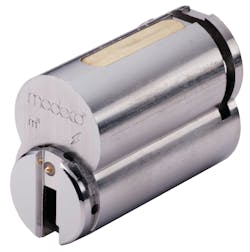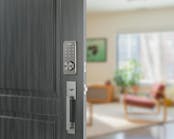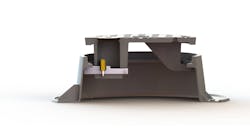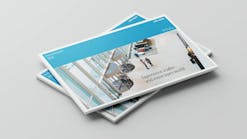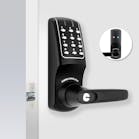When it comes to maintaining security with keys, the three rules most important rules are Control, Control and Control.
- Control the keyway and locks
- Control key distribution
- Control where and when the keys will work
Controlling the keyway is perhaps the most obvious solution. Without a controlled keyway, once you hand a key to another person, your security is over since nothing will prevent that key from being copied.
If you do not distribute keys (because they are only to be used for emergencies to override a malfunctioning electronic system, for example), then the vulnerability involves how easily the door can be forced open or the lock can be bypassed (picked).
With a restricted keyway, the responsibility passes to the end-user to accurately record the number of keys that exist for a particular lock, and who was given a key. If the end-user is unwilling or unable to do this, control is lost and their doors are not secure.
Controlling where and when a key will operate a lock is impossible with a purely mechanical key and lock solution. That’s why they invented electronic access control.
An assessment of the facility, the openings to be controlled, and the number of users all need to be considered to arrive at the best solution for a particular facility.
Another issue is maintaining life safety while implementing higher security and electronic access control solutions.
Many people feel that higher security and electronic solutions tend to over ride the life safety characteristics of the conventional mechanical locking device.
One of the main drivers of the evolution of security and access control away from keys and towards credentials was the idea that credential and software based security offered substantial advantages over keys, so it is no surprise that access control specialists de-emphasize locks and keys while they focus on software and credentials.
Whether this emphasis is fair and balanced is up to each of us to decide.
We can probably all agree that the most concise approach is to use restricted keyways, pick/attack-resistant locks and maintain the control of access and accountability electronically.
You have to touch each base in order to score a homerun.
As the security and access control markets mature and new technologies come on-line, end-users and system designers are re-thinking their tactics to address some of the unintended and unanticipated inconsistencies in their priorities and system design philosophies.
MEDECO is a legendary manufacturer of locks and keys whose reputation has been built on their controlled keys and pick resistant locks. For several years they have also been refining their approach to integrating the principles of mechanical key control with the realities of electronic access.
MEDECO’s unique posture in the lock and security industry enables the company to connect the dots in a direct solution-oriented fashion, since they do not have equity in hardware and technologies which may have been relevant at some point in time, but obviously whose time has past.
MEDECO3® incorporates three locking elements within the cylinder and on the key to produce an extremely pick proof, bump proof lock for home and business. The practice of unauthorized key duplication is eliminated, and the steel inserts at strategic points resist drilling and other physical attack.
Medeco locks are UL437 Listing for product integrity and security. Medeco cylinders were the first products in the security industry to be certified as meeting BHMA’s newest and highest standards. This independent organization’s A156.30 standard was approved and adopted by ANSI to provide specific guidance as to which products can be considered high security cylinders.
Q&A: Medeco’s Joseph Kingma
Locksmith Ledger visited Medeco headquarters in Salem, Va., and asked Joseph Kingma, vice president, Medeco eCylinder HSAM Special Projects, ASSA ABLOY High Security and Aftermarket Group, the questions we thought needed to be answered. Following are Ledger’s questions and Kingma’s answers.
Can you tell us a little about Medeco’s history?
Medeco was founded in 1968 based on a very inventive approach to making cylinders and keys more secure from the threat of surreptitious key duplication or manipulation. Its history runs deep with government, military, commercial and OEM customers as a result of a continued focus on innovative problem solving.
Medeco has many mechanical product platforms that provide users with patented key control and U.L. listed “high security” cylinders as well as platforms focused solely on prohibiting key duplication. Cylinders are available for nearly any mechanical hardware.
The company became very active in electronic cylinder technology in 1992 in “route collection” markets like payphones, vending, parking, etc. This expertise was leveraged to bring innovative products, like M3 Logic, to the “door security” business in 2007 with four different electronic cylinder platforms having been launched since.
Medeco, an ASSA ABLOY Group company, continues to be recognized globally as an innovator in the patented and electronic cylinder and key markets.
What is the MEDECO M3Logic product line’s genesis, and what features differentiate it from similar products?
Security needs have evolved quite notably over recent years with a quickly growing need for better accountability combined with the existing need for key control. M3Logic leverages Medeco’s extensive history and expertise with miniature electronics and combines with even greater expertise designing and manufacturing secure mechanical key systems. The resulting product allows users to enhance their existing Medeco mechanical systems by adding electronic cylinders and keys where needed to provide scheduling and audit for openings where greater flexibility and/or accountability is required to meet codes or other requirements.
M3 Logic cylinders fit nearly any existing hardware and require no wiring or door/frame modification, so they can be installed in minutes and moved if needs change. M3 Logic is available in any M3 mechanical keyway (with same electronics available on previous Medeco patented products), so ideal upgrade for existing installations.
M3 Logic is manufactured entirely in Salem, Va., and backed by team that is recognized globally as a leader in locking systems.
What markets is this product directed towards?
Virtually every market has a need enhance flexibility or accountability on many openings. We see this product as solution for anyone that has mechanical system that may need greater flexibility or accountability or those with electronic access control needs but without budget to cover high price or ability to pull wires or to modify doors.
Is the M3 Logic more as a controlled keyway or an electronic access control?
It is both. The M3 Logic keys are built around a traditional Medeco mechanical key section, so they are protected by the same utility patents that Medeco has demonstrated to be so effective. It offers all of the control that Medeco customers expect along with added benefit of having unique electronic system identifier associated with the electronic portion of the key. M3Logic also offers many of the benefits of electronic access control since it provides an audit trail on both the key and the cylinder, and allows time and date access scheduling consistent with traditional access control.
Can M3 and M3 Logic be combined on a single site to achieve the desired level of security while still permitting future upgrades to electronics?
Even better… there are three cylinder technologies available that will work within a single M3Logic system. All three cylinder types can be controlled with the M3Logic key.
First, for doors where the highest level of accountability is required, users should install M3Logic with audit and scheduling capabilities.
If no audit or scheduling are required, a mechanical M3 cylinder should be installed – which provides UL Listed High Security.
Finally, if the drill and pick resistance are not as important as just having patented key control, Medeco BiLevel mechanical cylinder should be installed.
If a locksmith encounters a customer using a restricted keyway who has become disenchanted with the current dealer, or who may be a candidate for a transitional upgrade to electronics what benefits can the locksmith offer the customer to switch-over to Medeco?
We see this happening quite often, where an end-user has competitive products and the competitive product range is not enough to satisfy their needs. In these cases, Medeco M3Logic is an ideal product to transition them into, as they can install the Medeco product in the most critical doors to take care of immediate need and then install remaining as time or budget permits.
Can you explain the meaning of key control and its importance to the end-user and the locksmith?
Key control is a term we use in the industry very freely without realizing that the end-user doesn’t always understand. Simply put, without an effective means of key control – most effective being via tight control of utility patent – keys can be duplicated without any restriction or notification to the system administrator, thus introducing significant potential for loss or liability to the facility.
Would the M3Logic be categorized as an electronic access control, or does it define a unique category?
M3 Logic and other eCylinders have essentially created the need for a new category of products that we’ve labeled as “Loss and Liability Control.” Loss and Liability Control provides greater flexibility than mechanical cylinders by offering scheduling and expiring keys along with audit trails, but not all of the immediate data and/or lock-down and integration options gained through traditional access control… and at a much lower price point than traditional access control.
What would you consider the minimum number of cylinders required to make an M3Logic switchover feasible?
There is no minimum. We have systems with as few as one cylinder, up to tens or thousands of cylinders. That is the beauty of the M3Logic eCylinder technology.
Who are M3 Logic’s competitors and how do they compare?
Other ASSA ABLOY brand companies have similar electronic cylinder products that leverage the same ASSA ABLOY proprietary electronic “CLIQ” technology. Each of these branded eCylinder products function in similar manner, and typically are chosen by end-users used based on the preference for the base mechanical system. Non-ASSA ABLOY group products do not have the significant advantage of being able to extend functionality of existing mechanical systems, nor do they typically have the depth of knowledge around complex keying and security needs.
What is required to become a Medeco dealer?
Medeco has many types of dealer agreements available depending on the desired thousands of cylinders. That is the beauty of the M3 Logic eCylinder technology: restrictions on the mechanical key system. This applies both to mechanical-only dealers and to eCylinder dealers since the M3Logic eCylinder system is paired with the mechanical technology.
What investment is required for the locksmith to deploy and service an M3 system?
The locksmith would need to have the appropriate Medeco mechanical tools and components (pin kit, etc) to service the mechanical portions. For electronic system management, there are multiple options depending on whether the locksmith wishes to manage the systems from a local PC, or leverage the cloud-based management services available from Medeco. Many of these options allow the locksmith to deploy and service an M3 Logic system for nearly no investment
How is pinning an M3 Logic cylinder and cutting an M3 Logic key different than pinning a conventional cylinder?
M3 Logic cylinders use slightly different pins than their mechanical equivalent, so a different pin kit is required, but otherwise servicing is identical. M3 Logic keys can be cut on standard Medeco key cutting equipment.
If a site has a combination of electronic and mechanical cylinders, does conventional masterkeying software support your product?
The current conventional masterkeying software packages still support management of the mechanical portion of the system, but none have adopted the electronic potion as of this response. The electronic management is handled through the M3 Logic management software – either online or locally installed.
Can you describe what happens in the cylinder when a key is inserted?
The cylinder will only operate when a key is inserted that has been cut to the proper combination required for that cylinder, AND when it has been given electronic access. The cylinder employs five mechanical pin stacks that must be satisfied by the proper key cut. Simultaneously, the key must have electronic permission to open the cylinder, which causes an electronic blocking mechanism to “unlock” the cylinder. If the key was cut to the proper combination but the key was programmed to NOT open the cylinder, it would not open (and an audit event would be left on both the key and the cylinder of the attempt).
What impact will NFC and similar Bluetooth products have on your position in the security marketplace?
We currently have Bluetooth programming devices that allow keyholders to update their key access rights through a mobile phone or Bluetooth-enabled PC from virtually anywhere in the world – which is especially useful for applications where access is needed without advance knowledge. In such cases, the keyholder can simply call an administrator to have the changes made, then insert their key into a mobile programmer and receive the updates. One of the major advantages to this is that any user key can be updated this way.
Medeco To Launch Site Survey Wizard at ALOA
Today’s Security Professional is looking for a faster and easier way to complete the sometimes intensive level of documentation that accompanies a site survey. In response to this need, Medeco has developed a mobile site surveying tool called the Site Survey Wizard and will be launched at this year’s ALOA show, July 12-14 in Baltimore.
Medeco’s Site Survey Wizard is a mobile application (app) powered by the iOS and Android software platforms for smart phones and tablets. The Site Survey Wizard app is free and is available from the Apple App Store, Google Play, and Amazon Appstore.
Medeco’s Site Survey Wizard app is a more efficient and more productive tool for capturing the information that is important during a site survey. The Site Survey Wizard app puts all the little elements of key and door detail together so jobs are quoted accurately, awarded more frequently and delivered on time. Download your copy of the Site Survey App Wizard, and visit the Medeco Booth # 401 at ALOA for a quick tutorial.
In a typical site survey, capturing door hardware data and keying details is documented manually with pen and paper. Sometimes, a voice recorder is used to capture the survey information. Either way, the written or recorded data must be formatted into an electronic format that can be imported into an internal system for processing, or formatted in a way that makes the order crystal clear to the Wholesaler or Manufacturer. Imagine if all that data entry could be done without doing double work (once at the door, secondly at the computer).
The Site Survey Wizard app takes keying data collected from the survey and produces it in an organized format that can be easily understood by staff and wholesalers or manufacturers. Producing keying data in an organized format helps the factory understand what the exact keying needs are. A clear understanding of keying needs speeds up the design process, leading to faster order turnaround, and meeting the original delivery expectations of your customer, enhancing their overall experience.
A feature article in a future Locksmith Ledger issue will provide additional details.
Tim O'Leary
Tim O'Leary is a security consultant, trainer and technician who has also been writing articles on all areas of locksmithing & physical security for many years.
